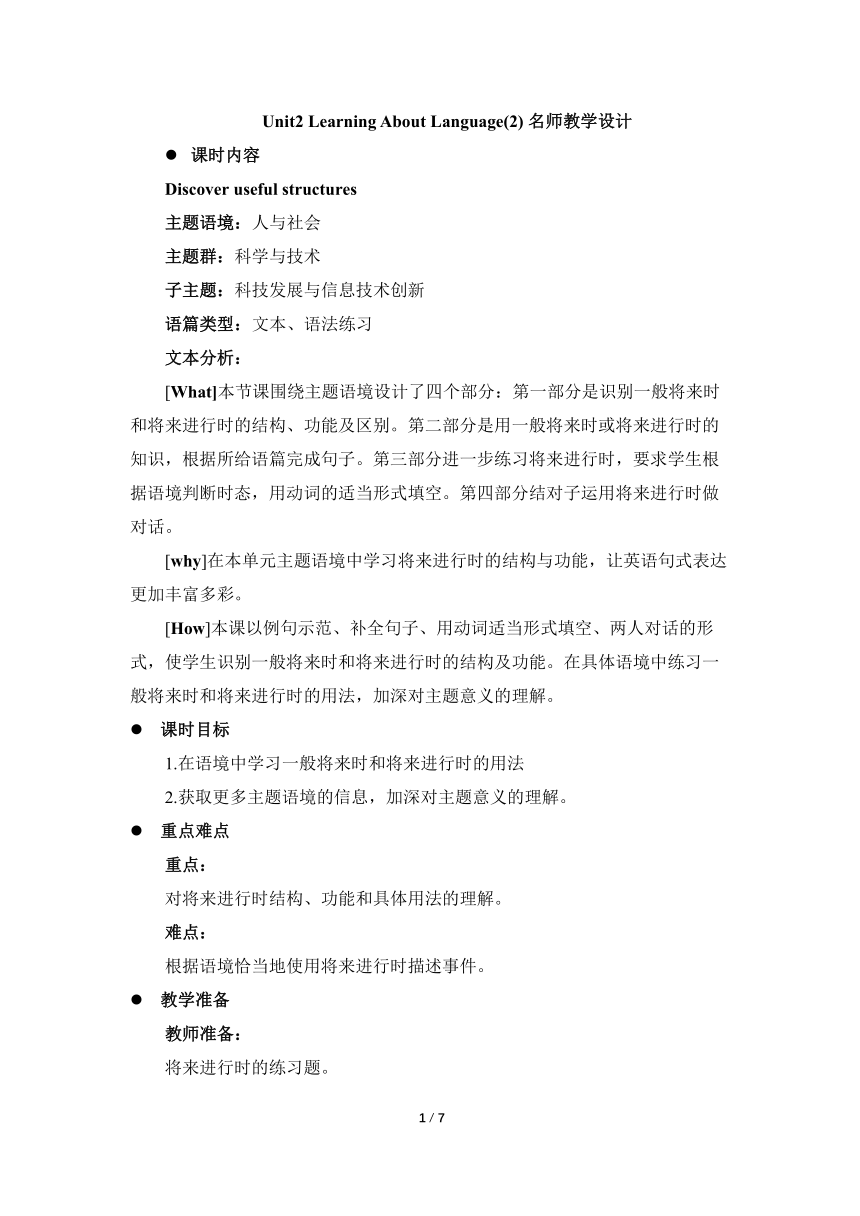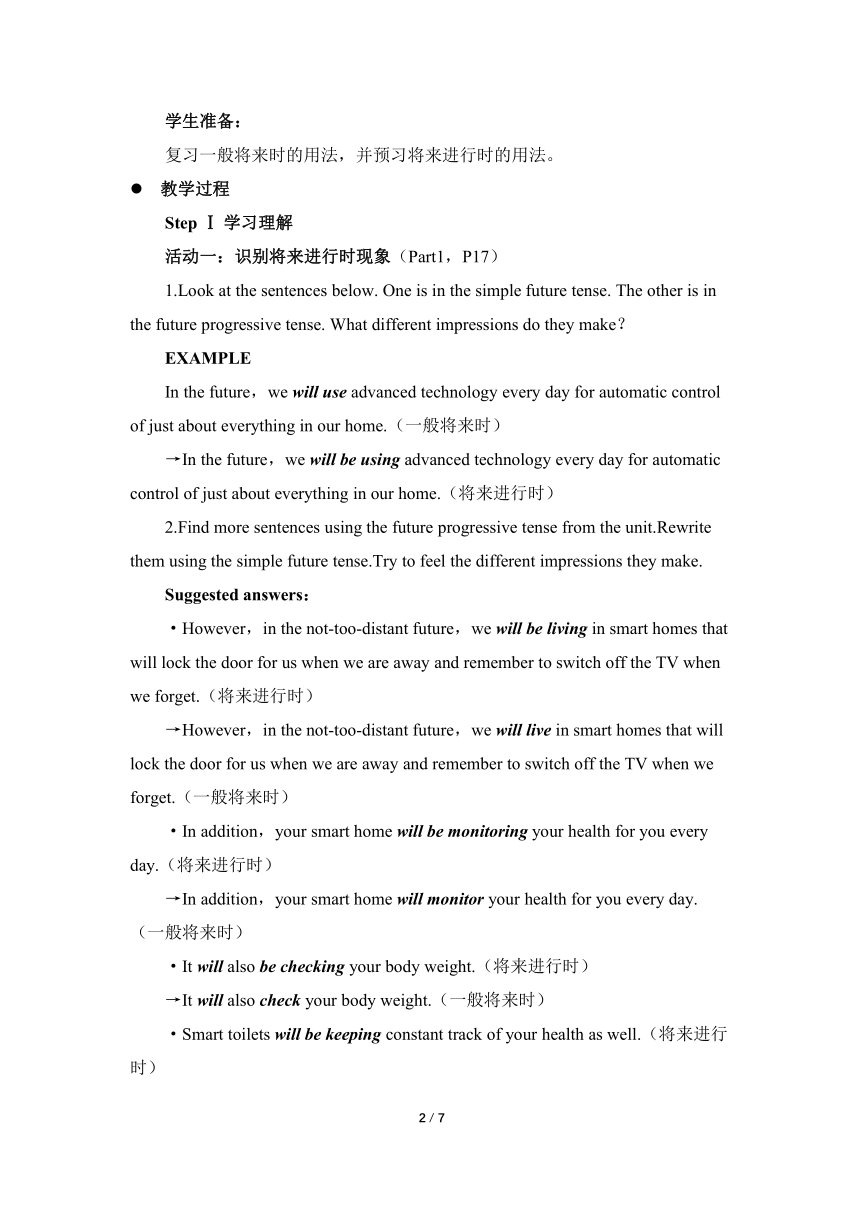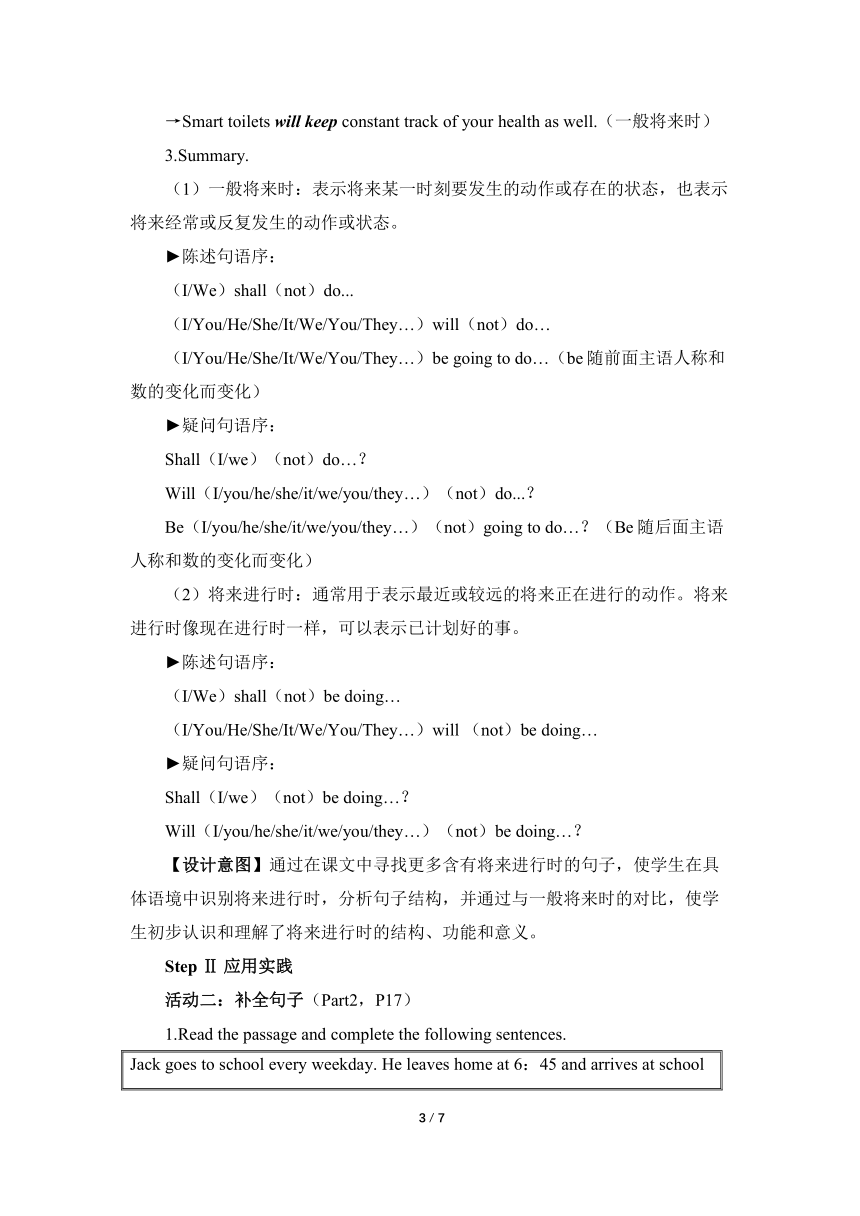人教版(2019)选择性必修第一册 Unit2Looking into the Future Learning About Language(2) 名师教学设计
文档属性
| 名称 | 人教版(2019)选择性必修第一册 Unit2Looking into the Future Learning About Language(2) 名师教学设计 |  | |
| 格式 | docx | ||
| 文件大小 | 24.3KB | ||
| 资源类型 | 教案 | ||
| 版本资源 | 人教版(2019) | ||
| 科目 | 英语 | ||
| 更新时间 | 2023-03-11 12:11:17 | ||
图片预览



文档简介
Unit2 Learning About Language(2) 名师教学设计
课时内容
Discover useful structures
主题语境:人与社会
主题群:科学与技术
子主题:科技发展与信息技术创新
语篇类型:文本、语法练习
文本分析:
[What]本节课围绕主题语境设计了四个部分:第一部分是识别一般将来时和将来进行时的结构、功能及区别。第二部分是用一般将来时或将来进行时的知识,根据所给语篇完成句子。第三部分进一步练习将来进行时,要求学生根据语境判断时态,用动词的适当形式填空。第四部分结对子运用将来进行时做对话。
[why]在本单元主题语境中学习将来进行时的结构与功能,让英语句式表达更加丰富多彩。
[How]本课以例句示范、补全句子、用动词适当形式填空、两人对话的形式,使学生识别一般将来时和将来进行时的结构及功能。在具体语境中练习一般将来时和将来进行时的用法,加深对主题意义的理解。
课时目标
1.在语境中学习一般将来时和将来进行时的用法
2.获取更多主题语境的信息,加深对主题意义的理解。
重点难点
重点:
对将来进行时结构、功能和具体用法的理解。
难点:
根据语境恰当地使用将来进行时描述事件。
教学准备
教师准备:
将来进行时的练习题。
学生准备:
复习一般将来时的用法,并预习将来进行时的用法。
教学过程
Step Ⅰ 学习理解
活动一:识别将来进行时现象(Part1,P17)
1.Look at the sentences below. One is in the simple future tense. The other is in the future progressive tense. What different impressions do they make?
EXAMPLE
In the future,we will use advanced technology every day for automatic control of just about everything in our home.(一般将来时)
→In the future,we will be using advanced technology every day for automatic control of just about everything in our home.(将来进行时)
2.Find more sentences using the future progressive tense from the unit.Rewrite them using the simple future tense.Try to feel the different impressions they make.
Suggested answers:
·However,in the not-too-distant future,we will be living in smart homes that will lock the door for us when we are away and remember to switch off the TV when we forget.(将来进行时)
→However,in the not-too-distant future,we will live in smart homes that will lock the door for us when we are away and remember to switch off the TV when we forget.(一般将来时)
·In addition,your smart home will be monitoring your health for you every day.(将来进行时)
→In addition,your smart home will monitor your health for you every day.(一般将来时)
·It will also be checking your body weight.(将来进行时)
→It will also check your body weight.(一般将来时)
·Smart toilets will be keeping constant track of your health as well.(将来进行时)
→Smart toilets will keep constant track of your health as well.(一般将来时)
3.Summary.
(1)一般将来时:表示将来某一时刻要发生的动作或存在的状态,也表示将来经常或反复发生的动作或状态。
陈述句语序:
(I/We)shall(not)do...
(I/You/He/She/It/We/You/They…)will(not)do…
(I/You/He/She/It/We/You/They…)be going to do…(be随前面主语人称和数的变化而变化)
疑问句语序:
Shall(I/we)(not)do…?
Will(I/you/he/she/it/we/you/they…)(not)do...?
Be(I/you/he/she/it/we/you/they…)(not)going to do…?(Be随后面主语人称和数的变化而变化)
(2)将来进行时:通常用于表示最近或较远的将来正在进行的动作。将来进行时像现在进行时一样,可以表示已计划好的事。
陈述句语序:
(I/We)shall(not)be doing…
(I/You/He/She/It/We/You/They…)will (not)be doing…
疑问句语序:
Shall(I/we)(not)be doing…?
Will(I/you/he/she/it/we/you/they…)(not)be doing…?
【设计意图】通过在课文中寻找更多含有将来进行时的句子,使学生在具体语境中识别将来进行时,分析句子结构,并通过与一般将来时的对比,使学生初步认识和理解了将来进行时的结构、功能和意义。
Step Ⅱ 应用实践
活动二:补全句子(Part2,P17)
1.Read the passage and complete the following sentences.
Jack goes to school every weekday. He leaves home at 6:45 and arrives at school at about 7:30. His morning classes begin at 8:00 o’clock and continue until 12:15 Then he has lunch,which takes about half an hour. His classes begin again at 1:30 in the afternoon and end at 3:50. He goes to the school’s football club at 4:30 and finishes practice at 6:00. He arrives home at about 6:45. Every day he follows the same routine and tomorrow will be no exception. ①At 6:30 a.m. tomorrow,… A he’ll be leaving the house. B he’ll be at home. ②At 8:10 a.m. tomorrow,… A he’ll be having a class. B he’ll have a class. ③At 12:30 tomorrow,… A he’ll be having lunch. B he’ll have lunch. ④At 5:00 p. m. tomorrow,… A he’ll be practising football. B he’ll practise football. ⑤At 6:45 p.m. tomorrow,… A he’ll be arriving home. B he’ll arrive home.
Suggested answers:
①~⑤ BAAAA
【设计意图】通过阅读已给语篇内容,把握文章中各个动作事件发生的具体时间,判断这些动作是持续了一段时间,还是瞬间完成。对于在未来一段时间内正在发生且持续发生的动作,选择将来进行时;而对于在未来时间点瞬间结束的将来动作,选择一般将来时。通过该活动,让学生在练习中感受、总结出这些基本规律,并正确使用。
活动三:强化训练(Part3,P17)
Fill in the blanks with the proper forms of the verbs in brackets.
① You can call me then. I _______(not sleep). ② They set off at 9:00 a.m and thought they _______(reach)the airport an hour later. ③ Will you _______(wait)for me until I find the electrical wires? ④ Better not hang out with Sam then. He _______(work)on his article on critical thinking. ⑤ I guess most parents _______(support)the new plan at e meeting tomorrow.
Suggested answers:
① won’t be sleeping
② would reach
③ wait
④ will be working
⑤ will support
【设计意图】通过进一步的练习,使学生更加明确将来进行时的特征,训练学生根据上下文判断句子时态的能力,使学生体会将来进行时在具体语境中所表达的不同意义,并灵活使用。
Step Ⅲ 迁移创新
活动四:情境应用(Part4,P17)
Work in pairs. Read the travel plan and make up a conversation using the future progressive tense.
Monday Fly to Bejing from Melbourne,arrive at 10:00 a.m.;Visit the Summer Palace in the afternoon
Tuesday Morning:visit the Palace Museum; Afternoon:go to Wangfujing Street
Wednesday Go to the Great Wall,three hours’ drive there and back
Thursday Go sightseeing in Shichahai;Visit National Museum of China
Friday Trip to Zhangjiakou
Saturday Back to Beijing in the afternoon;Watch Beijing Opera at the Mei Lanfang Theatre
Sunday Return to Melbourne
Suggested answer:
A:I hear that you will travel to China. Wow! It’s wonderful! How many days will you be there? How will you get there?
B:Altogether seven days. I will fly to Beijing on Monday morning. And I will arrive there at 10:00 a. m.
A:What will you plan to do after your arrival?
B:Of course,first I will check in the hotel. After lunch,I will have a short break. For the afternoon,I will be visiting the Summer Palace.
A:Sounds great!
B:If you are really interested in my travel plan,I’m glad to share it with you.
A:I am all ears.
B:It’s my pleasure. On Tuesday morning,I will be visiting the Palace Museum. And in the afternoon,I will be wandering in Wangfujing Street. The next day,I will be visiting the Great Wall,and I will be driving the car for three hours there and back. On Thursday,I will be going sightseeing in Shichahai and visiting National Museum of China.
A:I see you will know more about China,especially,Beijing. Will you plan to go to other places except Beijing?
B:I will be travelling to Zhangjiakou on Friday.
A:I hear that’s a beautiful place.
B:Yes. But after one and a half days in Zhangjiakou,I will be back to Beijing in the afternoon on Saturday. Then,I will be watching Beijing Opera at the Mei Lanfang Theatre. On Sunday,I will return to Melbourne.
A:Very wonderful plan for your trip. Have a good trip!
B:Thank you for your kindness!
【设计意图】在学习和练习了将来进行时的用法之后,在特定的语境中,用对话的形式表达自己的想法,这加深了学生对将来进行时用法的理解,改变了单纯语法练习,提高了学生学习语法的兴趣。
板书设计
Unit 2 Looking into the Future Period Ⅲ Learning About Language(2) Ⅰ.学习理解 活动一:识别将来进行时现象 Ⅱ.应用实践 活动二:补全句子 活动三:强化训练 Ⅲ.迁移创新 活动四:情境应用
2 / 2
课时内容
Discover useful structures
主题语境:人与社会
主题群:科学与技术
子主题:科技发展与信息技术创新
语篇类型:文本、语法练习
文本分析:
[What]本节课围绕主题语境设计了四个部分:第一部分是识别一般将来时和将来进行时的结构、功能及区别。第二部分是用一般将来时或将来进行时的知识,根据所给语篇完成句子。第三部分进一步练习将来进行时,要求学生根据语境判断时态,用动词的适当形式填空。第四部分结对子运用将来进行时做对话。
[why]在本单元主题语境中学习将来进行时的结构与功能,让英语句式表达更加丰富多彩。
[How]本课以例句示范、补全句子、用动词适当形式填空、两人对话的形式,使学生识别一般将来时和将来进行时的结构及功能。在具体语境中练习一般将来时和将来进行时的用法,加深对主题意义的理解。
课时目标
1.在语境中学习一般将来时和将来进行时的用法
2.获取更多主题语境的信息,加深对主题意义的理解。
重点难点
重点:
对将来进行时结构、功能和具体用法的理解。
难点:
根据语境恰当地使用将来进行时描述事件。
教学准备
教师准备:
将来进行时的练习题。
学生准备:
复习一般将来时的用法,并预习将来进行时的用法。
教学过程
Step Ⅰ 学习理解
活动一:识别将来进行时现象(Part1,P17)
1.Look at the sentences below. One is in the simple future tense. The other is in the future progressive tense. What different impressions do they make?
EXAMPLE
In the future,we will use advanced technology every day for automatic control of just about everything in our home.(一般将来时)
→In the future,we will be using advanced technology every day for automatic control of just about everything in our home.(将来进行时)
2.Find more sentences using the future progressive tense from the unit.Rewrite them using the simple future tense.Try to feel the different impressions they make.
Suggested answers:
·However,in the not-too-distant future,we will be living in smart homes that will lock the door for us when we are away and remember to switch off the TV when we forget.(将来进行时)
→However,in the not-too-distant future,we will live in smart homes that will lock the door for us when we are away and remember to switch off the TV when we forget.(一般将来时)
·In addition,your smart home will be monitoring your health for you every day.(将来进行时)
→In addition,your smart home will monitor your health for you every day.(一般将来时)
·It will also be checking your body weight.(将来进行时)
→It will also check your body weight.(一般将来时)
·Smart toilets will be keeping constant track of your health as well.(将来进行时)
→Smart toilets will keep constant track of your health as well.(一般将来时)
3.Summary.
(1)一般将来时:表示将来某一时刻要发生的动作或存在的状态,也表示将来经常或反复发生的动作或状态。
陈述句语序:
(I/We)shall(not)do...
(I/You/He/She/It/We/You/They…)will(not)do…
(I/You/He/She/It/We/You/They…)be going to do…(be随前面主语人称和数的变化而变化)
疑问句语序:
Shall(I/we)(not)do…?
Will(I/you/he/she/it/we/you/they…)(not)do...?
Be(I/you/he/she/it/we/you/they…)(not)going to do…?(Be随后面主语人称和数的变化而变化)
(2)将来进行时:通常用于表示最近或较远的将来正在进行的动作。将来进行时像现在进行时一样,可以表示已计划好的事。
陈述句语序:
(I/We)shall(not)be doing…
(I/You/He/She/It/We/You/They…)will (not)be doing…
疑问句语序:
Shall(I/we)(not)be doing…?
Will(I/you/he/she/it/we/you/they…)(not)be doing…?
【设计意图】通过在课文中寻找更多含有将来进行时的句子,使学生在具体语境中识别将来进行时,分析句子结构,并通过与一般将来时的对比,使学生初步认识和理解了将来进行时的结构、功能和意义。
Step Ⅱ 应用实践
活动二:补全句子(Part2,P17)
1.Read the passage and complete the following sentences.
Jack goes to school every weekday. He leaves home at 6:45 and arrives at school at about 7:30. His morning classes begin at 8:00 o’clock and continue until 12:15 Then he has lunch,which takes about half an hour. His classes begin again at 1:30 in the afternoon and end at 3:50. He goes to the school’s football club at 4:30 and finishes practice at 6:00. He arrives home at about 6:45. Every day he follows the same routine and tomorrow will be no exception. ①At 6:30 a.m. tomorrow,… A he’ll be leaving the house. B he’ll be at home. ②At 8:10 a.m. tomorrow,… A he’ll be having a class. B he’ll have a class. ③At 12:30 tomorrow,… A he’ll be having lunch. B he’ll have lunch. ④At 5:00 p. m. tomorrow,… A he’ll be practising football. B he’ll practise football. ⑤At 6:45 p.m. tomorrow,… A he’ll be arriving home. B he’ll arrive home.
Suggested answers:
①~⑤ BAAAA
【设计意图】通过阅读已给语篇内容,把握文章中各个动作事件发生的具体时间,判断这些动作是持续了一段时间,还是瞬间完成。对于在未来一段时间内正在发生且持续发生的动作,选择将来进行时;而对于在未来时间点瞬间结束的将来动作,选择一般将来时。通过该活动,让学生在练习中感受、总结出这些基本规律,并正确使用。
活动三:强化训练(Part3,P17)
Fill in the blanks with the proper forms of the verbs in brackets.
① You can call me then. I _______(not sleep). ② They set off at 9:00 a.m and thought they _______(reach)the airport an hour later. ③ Will you _______(wait)for me until I find the electrical wires? ④ Better not hang out with Sam then. He _______(work)on his article on critical thinking. ⑤ I guess most parents _______(support)the new plan at e meeting tomorrow.
Suggested answers:
① won’t be sleeping
② would reach
③ wait
④ will be working
⑤ will support
【设计意图】通过进一步的练习,使学生更加明确将来进行时的特征,训练学生根据上下文判断句子时态的能力,使学生体会将来进行时在具体语境中所表达的不同意义,并灵活使用。
Step Ⅲ 迁移创新
活动四:情境应用(Part4,P17)
Work in pairs. Read the travel plan and make up a conversation using the future progressive tense.
Monday Fly to Bejing from Melbourne,arrive at 10:00 a.m.;Visit the Summer Palace in the afternoon
Tuesday Morning:visit the Palace Museum; Afternoon:go to Wangfujing Street
Wednesday Go to the Great Wall,three hours’ drive there and back
Thursday Go sightseeing in Shichahai;Visit National Museum of China
Friday Trip to Zhangjiakou
Saturday Back to Beijing in the afternoon;Watch Beijing Opera at the Mei Lanfang Theatre
Sunday Return to Melbourne
Suggested answer:
A:I hear that you will travel to China. Wow! It’s wonderful! How many days will you be there? How will you get there?
B:Altogether seven days. I will fly to Beijing on Monday morning. And I will arrive there at 10:00 a. m.
A:What will you plan to do after your arrival?
B:Of course,first I will check in the hotel. After lunch,I will have a short break. For the afternoon,I will be visiting the Summer Palace.
A:Sounds great!
B:If you are really interested in my travel plan,I’m glad to share it with you.
A:I am all ears.
B:It’s my pleasure. On Tuesday morning,I will be visiting the Palace Museum. And in the afternoon,I will be wandering in Wangfujing Street. The next day,I will be visiting the Great Wall,and I will be driving the car for three hours there and back. On Thursday,I will be going sightseeing in Shichahai and visiting National Museum of China.
A:I see you will know more about China,especially,Beijing. Will you plan to go to other places except Beijing?
B:I will be travelling to Zhangjiakou on Friday.
A:I hear that’s a beautiful place.
B:Yes. But after one and a half days in Zhangjiakou,I will be back to Beijing in the afternoon on Saturday. Then,I will be watching Beijing Opera at the Mei Lanfang Theatre. On Sunday,I will return to Melbourne.
A:Very wonderful plan for your trip. Have a good trip!
B:Thank you for your kindness!
【设计意图】在学习和练习了将来进行时的用法之后,在特定的语境中,用对话的形式表达自己的想法,这加深了学生对将来进行时用法的理解,改变了单纯语法练习,提高了学生学习语法的兴趣。
板书设计
Unit 2 Looking into the Future Period Ⅲ Learning About Language(2) Ⅰ.学习理解 活动一:识别将来进行时现象 Ⅱ.应用实践 活动二:补全句子 活动三:强化训练 Ⅲ.迁移创新 活动四:情境应用
2 / 2
